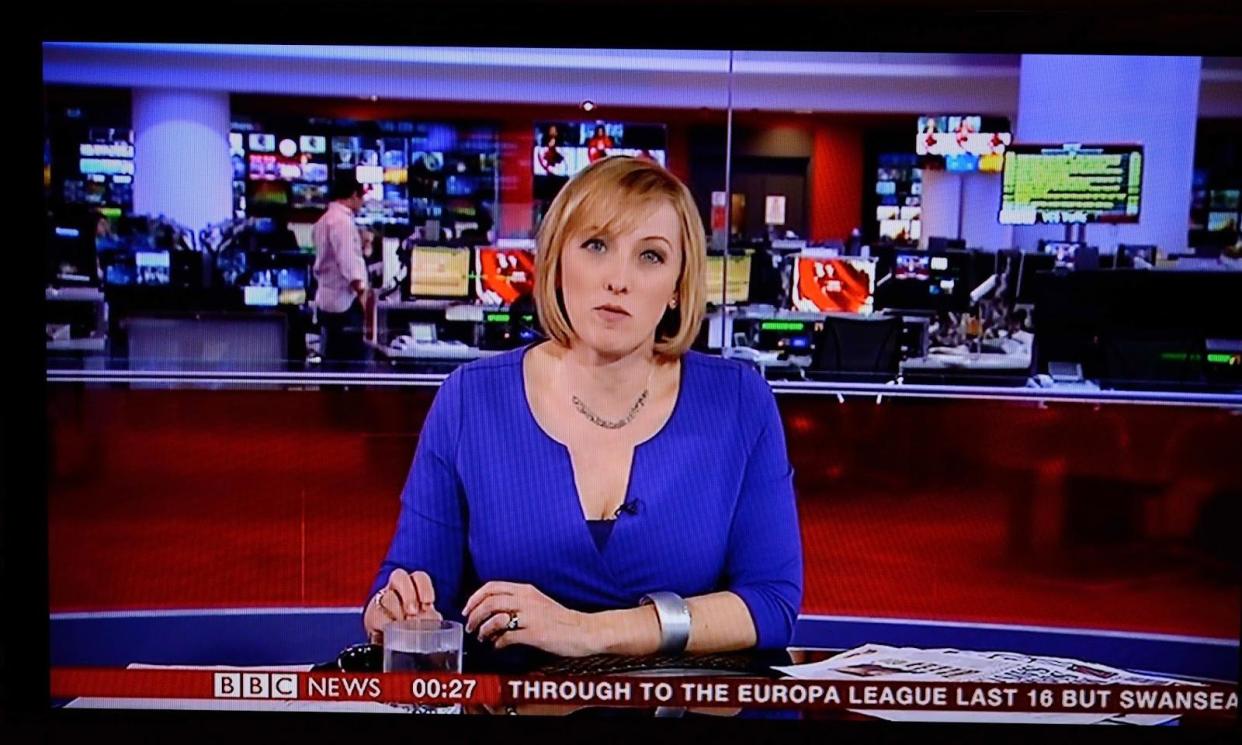Presenter Martine Croxall sues BBC for age and sex discrimination

The BBC is facing another damaging row over equal pay, with the presenter Martine Croxall taking legal action against the broadcaster for age and sex discrimination.
Croxall is suing the corporation after being off-air for more than a year following the merger of the BBC’s News and World News channels, according to listings for London Central tribunal court for 1 May.
The BBC declined to comment.
Last year BBC insiders warned of a potential ageism row at the broadcaster after the merger of the BBC News channel and its commercial global counterpart BBC World News, which resulted in the axing of some of the BBC News channel’s most famous faces – including Jane Hill and Ben Brown, as well as Croxall.
Geeta Guru-Murthy, Karin Giannone, Kasia Madera and Annita McVeigh have also been off air for more than a year, but Guru-Murthy and McVeigh recently returned to the news channel.
The BBC director general, Tim Davie, was asked about the situation during a culture, media and sport committee hearing last month. He said the BBC was moving towards a “fair resolution” for the women.
“It is not a good situation where you are paying people [who are not on air] and we are trying to get it resolved as fast as possible. I recognise that it has been going on for some time,” Davie said.
In 2020 Samira Ahmed won her equal pay claim against the BBC because of the difference between her £440-an-episode rate for presenting viewer feedback programme Newswatch and the £3,000 an episode Jeremy Vine received for hosting Points of View.
The BBC’s former China editor Carrie Gracie won substantial back pay in 2018 after going public with details of how she was out-earned by equivalent male journalists at the broadcaster. She later accused the corporation of lying and briefing against her.
In a difficult week for the BBC, the outgoing boss of its World Service also raised serious concerns about the impact of cuts on the broadcaster on Thursday. Liliane Landor told staff in an internal email that she was “deeply concerned about the operational capability of the World Service if additional cuts continue to weaken it further”.
Informing staff of her decision to leave, Landor said swingeing cuts in the past two years had “incrementally impacted our global reach and the breadth of our services”.
Government-imposed freezes to the licence fee have forced the BBC to make deep cuts to staffing and programmes, which Davie last month described as “shortsighted” and damaging to the UK’s soft power on the global stage. Davie said 14 years of cuts had reduced its budget by 30% in real terms and had “chipped away at our income over many years and have put serious pressure on our finances”.
The BBC World Service, which broadcasts in 42 languages across 59 countries, has been particularly hard hit. Traditionally funded directly by the government, George Osborne’s austerity measures brought in from 2010 shifted its funding on to domestic licence fee payers – a move that Davie said should be reversed.
Landor said the World Service had decided to “stop programmes and close platforms that were valued by our audiences”, but added that she was proud of the service for refusing “to let reduced funding stifle us”.
But while conflicts continue in the Middle East and Ukraine, Landor suggested that the BBC – and the UK – faced serious risks if the service continued to be cut. “The competition has become tougher, with state-funded bodies and other players significantly increasing their financial investment,” she said.

 Yahoo News
Yahoo News 
